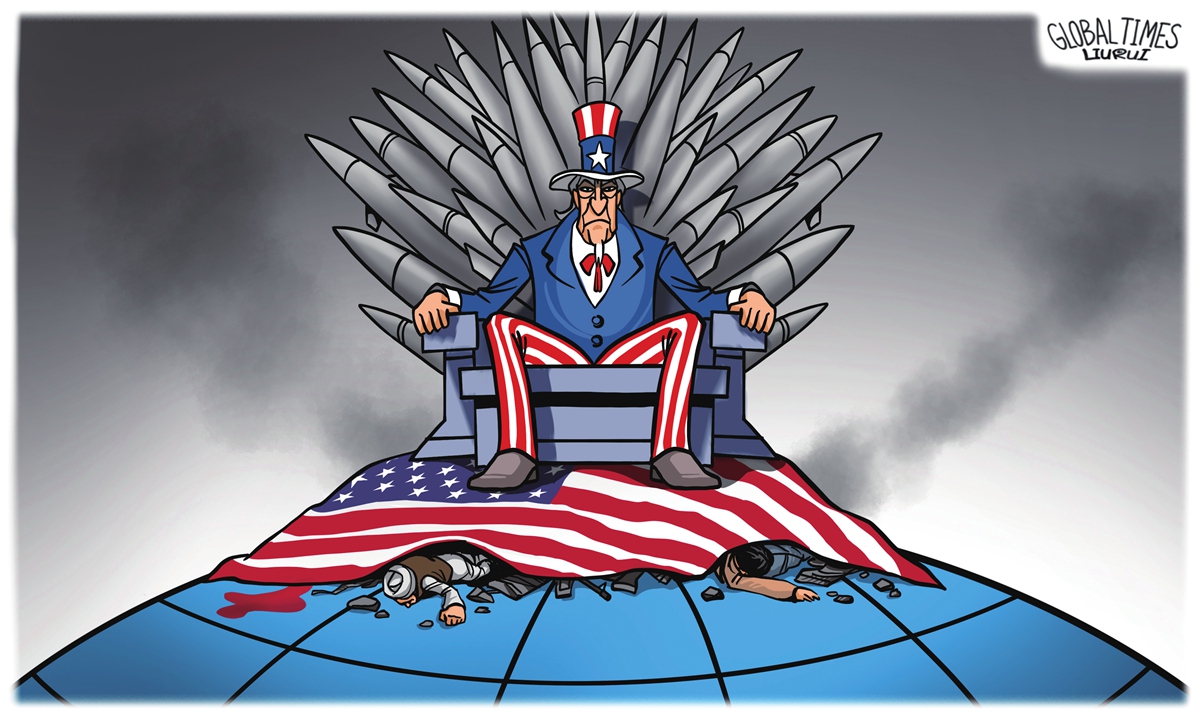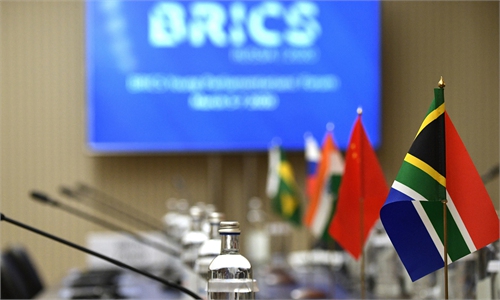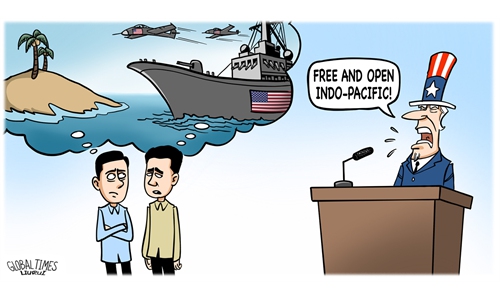
Illustration: Liu Rui/GT
The recent China focused speech by US Secretary of State Antony Blinken, despite all its calibrated wording, has little difference from that of his predecessor, Mike Pompeo, in 2020. It is no less backed by false logic, and goes further down the path of suppressing and containing China.
Blinken's China speech reflects some systemic problems in US foreign policy. For the China-US relationship to get back on track, the United States needs to first restore a healthy mindset. The following is a list of the symptoms of those problems:
Symptom one: indulgence in American hegemony
In his speech, Secretary Blinken depicted the United States as a defender of the international order. He seemed to envisage a world order where the United States stands out as the sole hegemon and the rest of the world must play along.
The United States has not really moved on from its 1989 fantasy. The fall of the Berlin Wall and the collapse of the Soviet bloc left the United States as the world's only superpower. Francis Fukuyama, who hailed that moment as "the end of history", recently predicted that the Russia-Ukraine conflict would make possible a "new birth of freedom" and "get us out of our funk about the declining state of global democracy". He wrote, "The spirit of 1989 will live on, thanks to a bunch of brave Ukrainians."
Yet the United States seems to forget that 1989 was no more than a small episode that had not changed the post-1945 international order. And that order was forged through the bloodshed of the Allies during the World Anti-Fascist War. The former Soviet Union lost 27 million lives on the battlefield, 35 million Chinese were also either killed or injured. The United States certainly lost some 400,000 brave soldiers, but is far from being in a position to disregard Russia, China or any other nation and define international order as it wishes.
The international order was never intended to be dominated by a single hegemon. The attempts to falsify history or gloss over hegemony cannot hold back the trend toward a world of multi-polarity, diversity and greater democracy within international relations. The United States will have to place its hegemonic power under the international order based on the UN Charter.
Symptom two: entrenched Cold War mindset
With frequent reference to "allies and partners" in Blinken's speech, the United States is simply attempting to strengthen its ideology-based alliance system and revive the faded "good old days" during the Cold War. That is unfortunately nothing but a delusion.
Mind is ultimately shaped by reality. For many US allies, in Europe and the Asia-Pacific alike, China is their biggest trading partner. And the recent years have also seen the EU and ASEAN becoming China's two biggest trading partners. While President Biden advertised the "Indo-Pacific strategy" across Asia, the Regional Comprehensive Economic Partnership (RCEP) consisting of China and 14 other Asia-Pacific members is forging ahead. Even the newly unveiled Indo-Pacific Economic Framework cannot stop other countries raising the embarrassing question: when will the United States return to the TPP?
Countries all have their own interests to take care of. Trump's foreign policy makes no secret of its "America first" bias. Biden's foreign policy is a thinly veiled copy. But when the economic costs really bite and the hysteria about values recedes, it is hard to see how those ideology-based alliances would end up well.
Symptom three: obsession with competition
The key word of Blinken's speech is competition, but such competition must be on the US terms. The previous "competitive, collaborative, and adversarial" has been replaced by "invest, align, and compete". But the message is the same: compete is the centerpiece, while invest and align are the means towards the end. And the battlefield is to be expanded to all spheres and the whole world to reshape China's geopolitical environment and space for growth.
The United States talks a lot about the so-called security of supply chains. The truth is: political correctness must be ensured even at the cost of economic decoupling. The US tariff war against China has not redressed the trade imbalance but precipitated American companies losing at least $1.7 trillion on stock markets, taken away 245,000 jobs, and reduced average real household income by about $1,300 per year. The exclusion of Huawei and ZTE from US telecoms networks cost carriers approximately $5.6 billion, while the Congress earmarked only $1.9 billion for reimbursements.
A recent CNN poll shows that only 34 percent of Americans approve of Biden's economic management. Forced decoupling with China was one of the major factors that drove up the US inflation rate to a 40-year high, pushing the US economy to the brink of a stagflation crisis. It runs counter to the laws of economics, and has destabilized global industrial and supply chains.
In the face of a global pandemic, regional flare-ups and a global economic slowdown, the right thing for the United States to do as the world's largest economy is to lift additional tariffs on Chinese imports and put an end to impractical decoupling with China, which causes more pain than gain and does nobody any good.
Any competition between the United States and China should be fair and healthy. Any such competition should be about better governance and improvement in people's lives.
But for that to happen, the United States should first reorient its China policy, focus on the three principles of mutual respect, peaceful coexistence and win-win cooperation, and work out a path where the two countries can level up together. When a peaceful, stable and more prosperous life is what normal people are longing for, sticking to a hegemonic mindset puts the US squarely on the wrong side of history.
The author is a commentator on international affairs, writing regularly for Global Times, China Daily etc. He can be reached at xinping604@gmail.com



